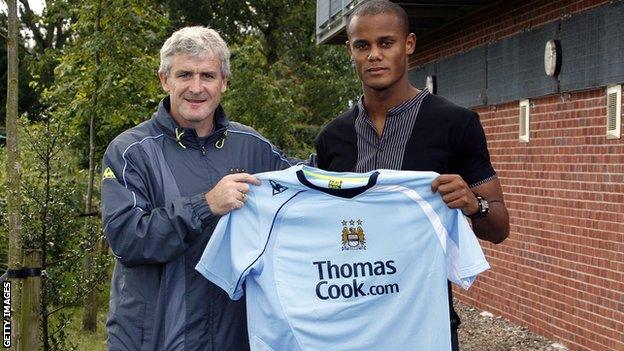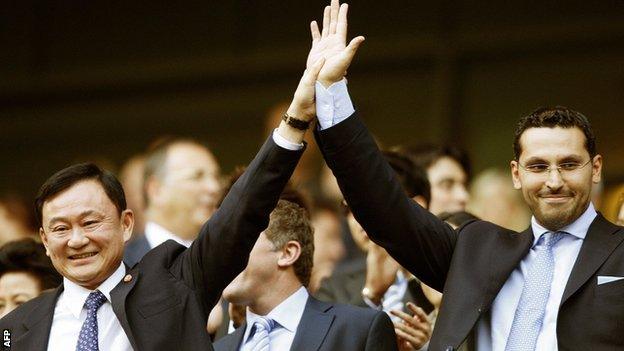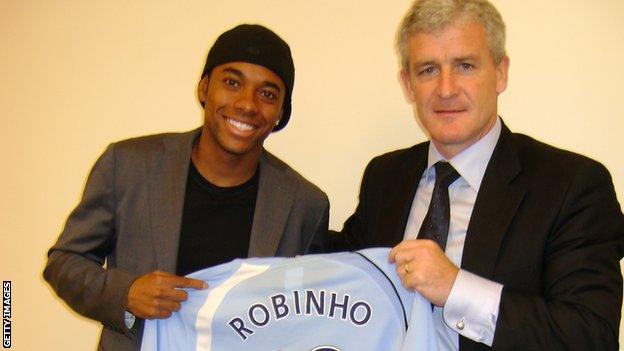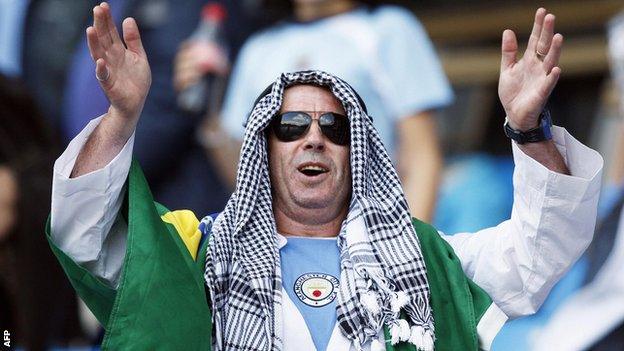Manchester City: Inside the deal on the day City became the richest club in the world
- Published
Manchester City were almost out of business - former chief executive
It was the deal that changed Manchester City, the Premier League and the football landscape forever.
On 1 September 2008, Sheikh Mansour Bin Zayed Al Nahyan's Abu Dhabi United Group agreed a £200m deal, external to take over City.
Ten years earlier they had been in the third tier of English football. With that deal, City became the richest club in the world and had the money to buy the very best footballing talent on the planet. A decade on they have spent more than £1.4bn on players, won three Premier League titles and become established as one of Europe's superpowers.
This is the story, from those who were there, of the most significant summer in English football...
Summer 2008 - 'Chaos'
Sven, a Thai Prime Minister & 8-1 defeats: Man City 10 years on
In August 2008, after his wife Pojaman's conviction for fraud, Thaksin Shinawatra jumped bail in his native Thailand and fled to Britain. At the time it was estimated Shinawatra had £1bn-worth of assets frozen, plunging his ownership of Manchester City into chaos. City had finished the previous season with an 8-1 defeat at Middlesbrough, with manager Sven-Goran Eriksson replaced by Mark Hughes. Chief executive Garry Cook led the search for a solution.
Garry Cook, who was appointed chief executive in May 2008: "There was chaos. Everybody was clinging to the wreckage. There wasn't a lot of hope and it was born out of the fact that financially, we were almost out of business.
"We couldn't pay the bills. We couldn't pay the wages. Money was frozen. It was a desperate situation and faced with that, you borrow money from wherever you can. We were borrowing from board members. It was not a plan to run a football club. It was one of survival.
"Finding partial investment was not an option. Someone had to take over the club 100%. Good fortune is always a major factor in situations like these and Abu Dhabi United Group were in the market for a football club.
"The dream we sold to them was more than just buying 24 footballers. It was about buying the opportunity to create something rather special.
"We didn't realise, as a group, the gravity of what was about to happen and the levels it would go to."
22 August 2008

When Vincent Kompany signed in 2008 Mark Hughes was City manager
Belgium international Vincent Kompany signs from Hamburg, originally joining as a midfielder, he has gone on to establish himself as one of the Premier League's greatest defenders and to this day he remains the club's captain.
Vincent Kompany: "I wasn't aware [of the planned takeover when I joined]. Like every player who signs for a new club I was told about big plans and big projects and them needing me to complete the project. You listen and you never believe. I was lucky, the guys came in, took over the club and held onto every single promise."
1 September 2008 - 'Complete relief'

Manchester City's Thai owner Thaksin Shinawatra (left) stands with new chairman Khaldoon Al Mubarak
Abu Dhabi United Group agree a deal, external to buy City from Shinawatra and the takeover is officially completed, external on 23 September.
Cook: "The feeling we had when we knew there was a deal was one of complete relief. Relief that we were going to go through change, relief that we wouldn't have to look back to where we were, relief that we were going to be able to maintain our financial well-being.
"At that stage, the agreement was all on one piece of paper. The irony was that as part of it we took a loan from the prospective owners to allow us to buy a single player in order to state the ambition of what was coming. That was Robinho."
Former defender Nedum Onuoha: "The takeover was a shock in itself, it was insane. Out of nowhere, we were getting called the richest club in football. It was a shock not just to the players, but the whole football world, it was such a big statement at that time."
Kompany: "There were a lot of East Asian people at the club. From one day to another, no-one was there anymore. You wonder who is going to be running the club. Next thing it is transfer deadline day, talk of transfers and Robinho coming in. Before you know it, he is sat next to us in the dressing room. Then we knew 'this is serious'."
1 September 2008 - 'I couldn't believe Robinho was my new team-mate'

Robinho joined for a British transfer record of £32.5m
City are linked to Tottenham striker Dimitar Berbatov, but he joins Manchester United. But in the final hours of deadline day on 1 September, City break the British transfer record by signing Brazilian forward Robinho from Real Madrid for £32.5m.
Cook: "We had the capital to go out and get a player, but we only had 24 hours. We had to really go through this ridiculous facade because, if we didn't get the player, the ownership might not take over. It was all very precarious. All a little bit storybook.
"We were making offers for players that were outrageous, unbelievable and made no sense. But we had to try and fulfil the obligation of the incoming owner, which was 'get me a marquee player'. Robinho was that guy.
"One thing I do remember about that day was the reaction of the fans. It was like they had this weight lifted off their shoulders."
Onuoha: "I will never forget being in my house watching deadline day on TV and there was breaking news that Robinho had signed for City - it felt like an out-of-body experience. I looked at it and thought 'there is no way Robinho has signed' and then I realised 'I play for City and Robinho is a new team-mate'.
"I thought 'wow I will go into work tomorrow and someone who I just watched play for Real Madrid, is now going to put on the blue of Manchester City and that is incredible'.
"That transfer took the club to a whole new level that they had not been at in Premier League history. This is someone who has now made the step from Real to come to the Premier League, at this club. It was totally surreal, the first sort of big statement.
"Of course he is just a human being, but he was the first real Galactico at the club. As much as we didn't want to, we looked at him differently to everybody else.
"The atmosphere and vibe completely changed in the team. It had always been a good place to be, but now it became exciting. The squad had a jewel added to it."
Kompany: "It was surreal because it was so out of proportion. A superstar was landing at a club where they hadn't seen a superstar in their prime for a long time. It hit home to everyone that the pressure was on to do well and succeed."
Groundsman Lee Jackson: "Someone came knocking on my office door and said we had bid £30m for Berbatov, I thought 'hold on, we have just paid £6m for Vincent Kompany, we have not got £30m'. All of a sudden Garry Cook is in Madrid signing someone called Robinho. Being a City fan, I had no knowledge of European football for obvious reasons, so I had to look up who he was."

A Manchester City supporter dons a traditional Middle Eastern headdress to celebrate the buyout of the club by the Abu Dhabi United Group
'I wonder if Kaka has any regrets?'
In January 2009, the first transfer window after the takeover, City fail in a £100m move for Brazil and AC Milan star Kaka. But later that year they sign Carlos Tevez from Manchester United. City erect a blue 'Welcome to Manchester' sign featuring Tevez , which prompts Sir Alex Ferguson to brand them United's 'noisy neighbour.' The summer after they sign Yaya Toure and David Silva, and in 2011 Sergio Aguero arrives.
Cook: "All of a sudden, people were paying attention to Manchester City. Everybody wanted to hear about it. We weren't used to that. Initially, we were voicing our intentions a bit too loudly. We needed to calm ourselves down.
"But there is a pace at which you should normally proceed and we did not have that luxury. The ambition that needed to be executed quickly. We wanted the best football team on the pitch and executive team off it. We wanted the best facilities and infrastructure.
"We went for Kaka, which was another declaration of our ambition. But our audacity made people sit up and think 'that's not right'. We started to be used as a tool players could use to renegotiate their own contracts. I wonder if Kaka took the time back, whether he would look at the situation differently and have joined Manchester City?
"Robinho was a moment. Carlos Tevez was a moment. But we changed the face of the football club when we signed David Silva and Yaya Toure in 2010."
A decade later - 'Kids wear City shirts with pride'
City, boasting some of the world's best players, have won three Premier League titles, the FA Cup and three League Cups and reached the semi-finals of the Champions League. In 2017-18, Pep Guardiola's side set a Premier League record number of goals, points and wins. A £200m state-of-the-art academy has been built and the owners have invested millions in the surrounding areas of the stadium.
Cook: "There is pride in the knowledge we never forgot where we came from. As Ferguson said, we were a little noisy in our ambition. But we were a club rooted in our community.
"The employees were rooted in the football club. Mike Summerbee, Colin Bell and Francis Lee were ambassadors. You want to take the history and heritage of 100 years, keep it, cherish it and hold on to it. But you also want to look forward and make change with the aim of being successful and sustainable over the long term.
"The thing is, there is no finish line in football club ownership. Ten years ago, kids wouldn't wear the City shirt among their peers because they didn't feel proud. Now, people around the world wear the City shirt with a lot of pride."
Kompany: "It is easy to track it [the differences from before the takeover] with the programme and the infrastructure. We already had a state-of-the-art stadium. It was a club with a lot of history - it was a big club already, but it did not have a big-club mentality. It had lost it somewhere along the road.
"The progress was tremendous. We always had the basics, but from one day to the other we had a 'no excuse' environment. Everything was there to allow us to focus on our football and to be successful."
Onuoha: "Only a year or two years after [the takeover] we started talking about Champions League. When I made my debut we finished in the top 10 and that was a good season, the next year we only just stayed up. This was a change in mindset and direction.
"It was about 10 years before, I was at Wembley when we beat Gillingham in the old Division Two play-off final, I was one of those watching who walked out when we were losing. Then 10 years later we get bought and 10 years later than that, we set a record points haul in the Premier League.
"It is ridiculous when you think about it like that, credit to those who had the vision of turning the club into what it is today."
Further coverage on the takeover across the BBC |
|---|
Radio 5 live from 11:00 BST on Saturday, 1 September |
Football Focus, BBC One, 12:00-13:00 BST Saturday, 1 September |
BBC Radio Manchester, Monday, 3 September, 18:00 BST |